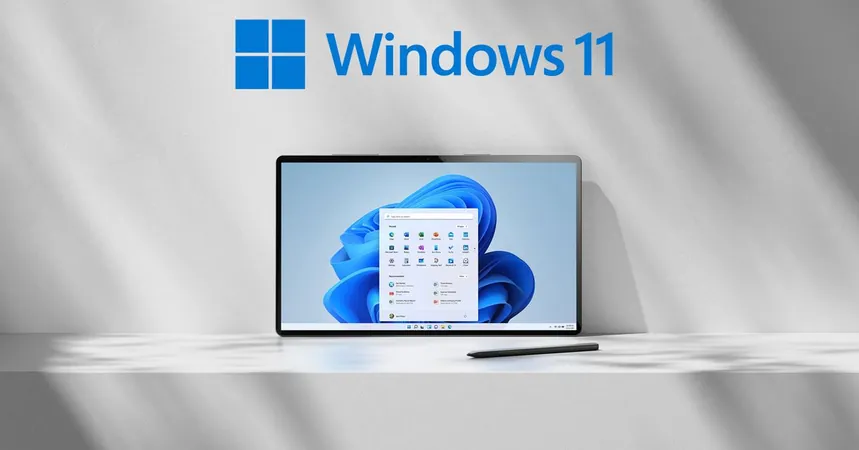
Microsoft Shuts Down Hopes for Windows 11 on Older Hardware: What You Need to Know!
2024-12-04
Author: Yu
Microsoft's Stance on Windows 11 and Older Hardware
Microsoft has dashed any lingering hopes that Windows 11 would support older hardware by reaffirming its strict requirements, especially the necessity for a Trusted Platform Module (TPM) 2.0. As the end of support for Windows 10 looms closer in October 2025, the tech giant is making it clear that there will be no relaxation on its hardware prerequisites to incentivize users to upgrade.
TPM 2.0: A Non-Negotiable Requirement
In an informative blog post titled 'TPM 2.0 – A Necessity for a Secure and Future-Proof Windows 11,' Microsoft stated the TPM 2.0 requirement is 'non-negotiable.' This hardware-based security feature was introduced unexpectedly when Windows 11 was launched in 2021, and nowadays, it is found in virtually all modern PCs.
The Importance of TPM 2.0
But why is TPM 2.0 so important? It acts as a hardware-level chip or firmware capability that not only enhances data encryption and digital signature verification but also bolsters the overall integrity and security of Windows devices. According to Steven Hosking, a senior product manager at Microsoft, 'TPM 2.0 plays a crucial role in enhancing identity and data protection on Windows devices,' especially as the integration of AI technologies into everyday hardware continues to grow.
Integration with Windows 11 Security Features
The TPM 2.0 feature integrates seamlessly with Windows 11’s cutting-edge security options, including Credential Guard, Windows Hello for Business, and BitLocker disk encryption. It also assists with Secure Boot, a critical component that protects the boot-up process from unauthorized alterations. Hosking emphasized that this standard is 'non-negotiable for the future of Windows,' underscoring a decisive shift towards modern security protocols.
Strict CPU Requirements
Moreover, Microsoft does not just enforce TPM 2.0; the company requires compatible CPUs that support virtualization-based security and hypervisor-protected code integrity (HVCI). This means that only processors released from 2018 onward can support Windows 11, further tightening the compatibility noose.
Workarounds and Microsoft's Response
While workarounds have emerged for users desperate to run Windows 11 on unsupported hardware, Microsoft has been explicitly closing these loopholes. Initially, the company didn't enforce strict compliance checks for virtualized instances of Windows 11, but recent updates, particularly the 24H2 update, have introduced more rigorous restrictions. Notably, tools like Flyby11 have had to adjust to bypass these checks, utilizing specific installation features.
Alternative for Businesses
For businesses looking for alternatives, Microsoft does offer the Windows 11 LTSC 2024 release, which makes TPM optional but still mandates a list of compatible CPUs.
Encouragement to Upgrade
To drive home their message, Microsoft is actively encouraging Windows 10 users to upgrade to new devices through full-screen prompts, echoing similar strategies used previously for Windows 7 and 8.1 users. This tactic follows announcements regarding the imminent support end for Windows 10, pushing users towards a modern system.
Conclusion
In summary, if you're still clinging to older hardware, now may be the time to think about an upgrade, as Microsoft’s insistence on TPM 2.0 and other stringent requirements leaves little room for older systems in the Windows 11 ecosystem. Are you ready to embrace the future, or will you stay with the past?


 Brasil (PT)
Brasil (PT)
 Canada (EN)
Canada (EN)
 Chile (ES)
Chile (ES)
 España (ES)
España (ES)
 France (FR)
France (FR)
 Hong Kong (EN)
Hong Kong (EN)
 Italia (IT)
Italia (IT)
 日本 (JA)
日本 (JA)
 Magyarország (HU)
Magyarország (HU)
 Norge (NO)
Norge (NO)
 Polska (PL)
Polska (PL)
 Schweiz (DE)
Schweiz (DE)
 Singapore (EN)
Singapore (EN)
 Sverige (SV)
Sverige (SV)
 Suomi (FI)
Suomi (FI)
 Türkiye (TR)
Türkiye (TR)